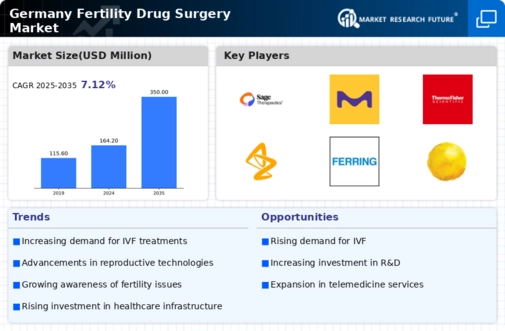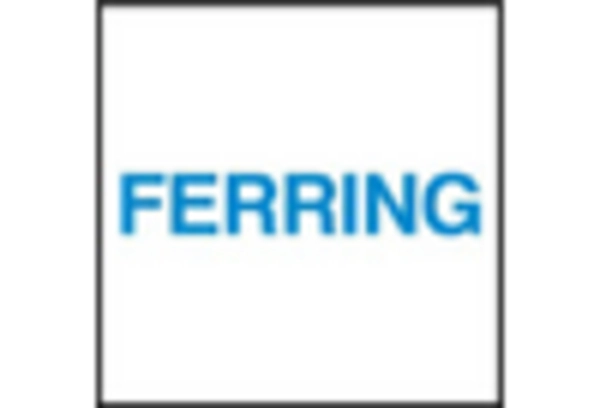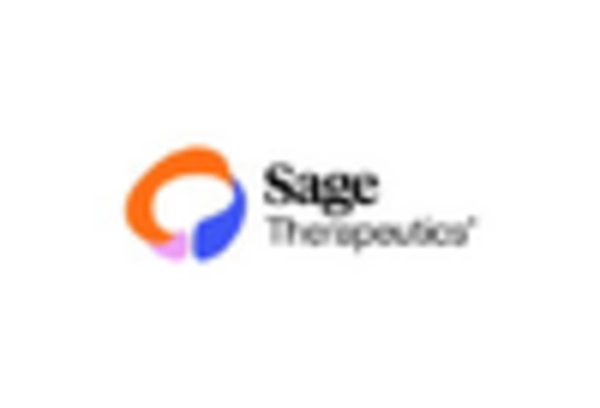Rising Infertility Rates
The fertility drug-surgery market in Germany is experiencing growth due to rising infertility rates among couples. Recent statistics indicate that approximately 15% of couples in Germany face challenges in conceiving, which has led to an increased demand for fertility treatments. This trend is further exacerbated by lifestyle factors such as delayed childbearing, obesity, and environmental influences. As more individuals seek assistance, the market for fertility drugs and surgical interventions is likely to expand. The increasing prevalence of conditions such as polycystic ovary syndrome (PCOS) and endometriosis also contributes to the demand for specialized treatments. Consequently, healthcare providers are adapting their services to meet the needs of this growing demographic, thereby driving the fertility drug-surgery market forward.
Increased Insurance Coverage
The fertility drug-surgery market in Germany is benefiting from an increase in insurance coverage for fertility treatments. Recent reforms have led to more comprehensive health insurance policies that include coverage for various fertility drugs and surgical procedures. As of 2025, approximately 60% of health insurance plans in Germany provide some level of support for assisted reproductive technologies. This shift is likely to alleviate the financial burden on couples seeking treatment, making it more accessible to a broader population. The reduction in out-of-pocket expenses may encourage more individuals to pursue fertility interventions, thus propelling the market forward. As awareness of available coverage grows, the fertility drug-surgery market is expected to see a surge in demand.
Growing Public Awareness Campaigns
Public awareness campaigns regarding infertility and available treatments are playing a crucial role in shaping the fertility drug-surgery market in Germany. Organizations and healthcare providers are increasingly engaging in educational initiatives to inform the public about infertility issues and the options available for treatment. These campaigns aim to destigmatize infertility and encourage individuals to seek help sooner. As awareness increases, more couples are likely to explore fertility treatments, contributing to market growth. In 2025, surveys indicate that nearly 70% of the population is aware of fertility treatment options, a significant increase from previous years. This heightened awareness is expected to drive demand for fertility drugs and surgical interventions, further expanding the market.
Advancements in Reproductive Technologies
Innovations in reproductive technologies are significantly impacting the fertility drug-surgery market in Germany. Techniques such as in vitro fertilization (IVF), intracytoplasmic sperm injection (ICSI), and preimplantation genetic testing (PGT) have revolutionized the approach to infertility treatment. The integration of advanced imaging and laboratory techniques has improved success rates, making these procedures more appealing to prospective parents. In 2024, the IVF success rate in Germany was reported at around 30%, which is expected to rise as technology continues to evolve. This progress not only enhances patient outcomes but also encourages more individuals to pursue fertility treatments, thereby stimulating market growth. As clinics invest in state-of-the-art equipment and training, the fertility drug-surgery market is poised for further expansion.
Collaboration Between Healthcare Providers
Collaboration among healthcare providers is emerging as a key driver of the fertility drug-surgery market in Germany. Fertility clinics, hospitals, and specialists are increasingly working together to provide comprehensive care for patients facing infertility challenges. This collaborative approach allows for the sharing of resources, knowledge, and best practices, ultimately enhancing patient outcomes. In 2025, it is estimated that over 40% of fertility clinics in Germany have established partnerships with other healthcare facilities to streamline patient care. Such collaborations not only improve the quality of services offered but also facilitate access to cutting-edge treatments. As the network of providers expands, the fertility drug-surgery market is likely to experience sustained growth.
















